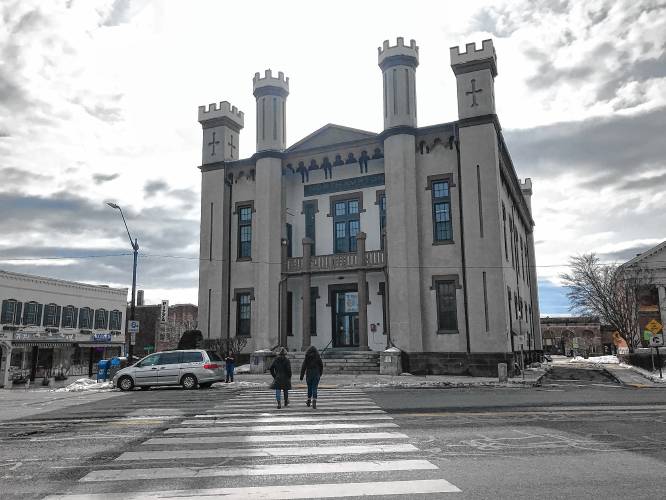Property taxes set to rise in Northampton

Northampton City Hall, 2019.
| Published: 11-14-2023 6:10 PM |
NORTHAMPTON — Single-family homeowners will likely see their tax bills go up by about $500 on average next year, even though the city is looking to lower its property tax rate.
That’s because the average single-family home in Northampton has ballooned 12.5% over the past year, from $424,527 to $477,690, according to the Office of the Assessor.
The City Council held a public hearing last week to discuss the city’s tax rate classification and new tax rate to take effect in January. The council is expected to vote on the new rate at its meeting on Thursday.
Assessors have calculated the tax rate for this fiscal year at $15.19 per $1,000 of assessed property value, a decrease from $15.84, or about 4%, from the previous rate.
If the change is adopted, the owner of an average single-family home valued at $477,690 would see their property tax bill go from $6,745 to $7,256, an increase of $511.
Assessors are also recommending that councilors retain a single tax rate for commercial and residential properties.
Assessors determine the average single-family home value by recording sales data from real estate transactions based on “arm’s length sales” — that is, sales based on fair market values where one side is not unfairly influencing the other.
The current residential tax rates in Northampton rank somewhere in the middle of the pack in comparison to nearby municipalities in western Massachusetts, higher than in Chicopee and Easthampton, but lower than in Holyoke, Greenfield and Amherst. As Northampton uses a single-tax rate rather than a split-tax for residents and businesses, commercial tax rates in the city tend to be lower than in other nearby cities.
Article continues after...
Yesterday's Most Read Articles
 A rocky ride on Easthampton’s Union Street: Businesses struggling with overhaul look forward to end result
A rocky ride on Easthampton’s Union Street: Businesses struggling with overhaul look forward to end result
 Northampton school budget: Tensions high awaiting mayor’s move
Northampton school budget: Tensions high awaiting mayor’s move
 Northampton man held without bail in December shooting
Northampton man held without bail in December shooting
 Hadley eyes smart growth zoning district
Hadley eyes smart growth zoning district
 ‘None of us deserved this’: Community members arrested at UMass Gaza protest critical of crackdown
‘None of us deserved this’: Community members arrested at UMass Gaza protest critical of crackdown
 Extreme weather forces valley farmers to adapt
Extreme weather forces valley farmers to adapt
At the Nov. 2 council meeting, the city’s principal assessor Marc Dautreuil recommended the city maintain its single tax rate, as is the case in the majority of Massachusetts municipalities.
“Splitting the tax rate, in my opinion, will put an unnecessary burden on the commercial, industrial and personal property classes which are already hurting from lingering aspects of COVID-19, inflation, low growth and lack of large construction projects,” Dautreuil told the council. “Northampton also does not have the industrial and large commercial businesses to successfully sustain a split tax rate.”
Should the city decide on a split tax, residential property owners would see their tax rate decrease by more than $700. But commercial and industrial properties would be on the hook for thousands more, with commercial properties needing to pay almost an additional $5,000 and industrial properties paying an increase of more than $6,600, according to the assessor’s office.
Under Massachusetts’ Proposition 2½ law, municipalities are limited in how much property tax revenue they may collect from their communities, with the limit each year determined by increasing the previous year’s limit by 2.5% along with an amount derived from the value of new construction and growth within the municipality.
“Generally with Proposition 2½, when assessed property values go up, the property tax on homes go down,” Dautreuil told the Gazette.
For Northampton, that means this year’s property tax levy is nearly $75 million — about a 3.77% increase from last year.
Property owners will see the tax bill increases when third-quarter bills go in the mail in January.
Alexander MacDougall can be reached at amacdougall@gazettenet.com.

 A Look Back, May 13
A Look Back, May 13 Southampton takes key step toward new public safety complex following TM vote
Southampton takes key step toward new public safety complex following TM vote State OKs Valley Green Energy program for Amherst, Northampton, Pelham
State OKs Valley Green Energy program for Amherst, Northampton, Pelham Southampton Town Meeting adopts noise nuisance bylaw, rejects unregistered vehicle rules
Southampton Town Meeting adopts noise nuisance bylaw, rejects unregistered vehicle rules
